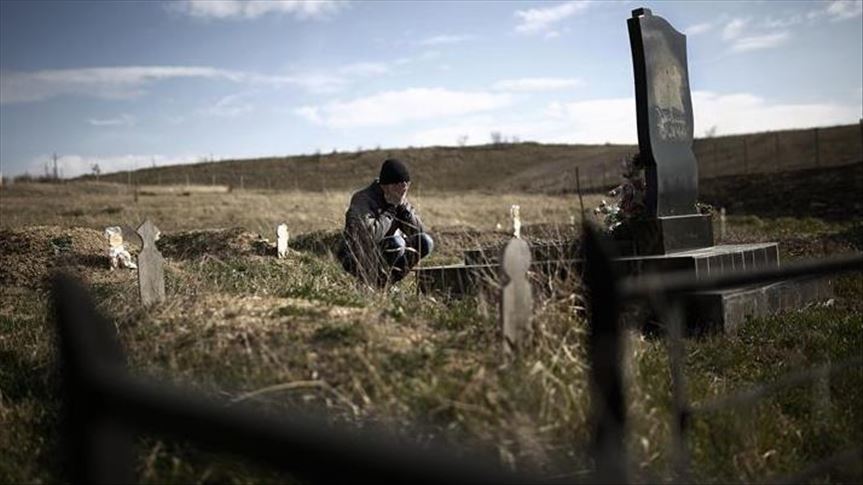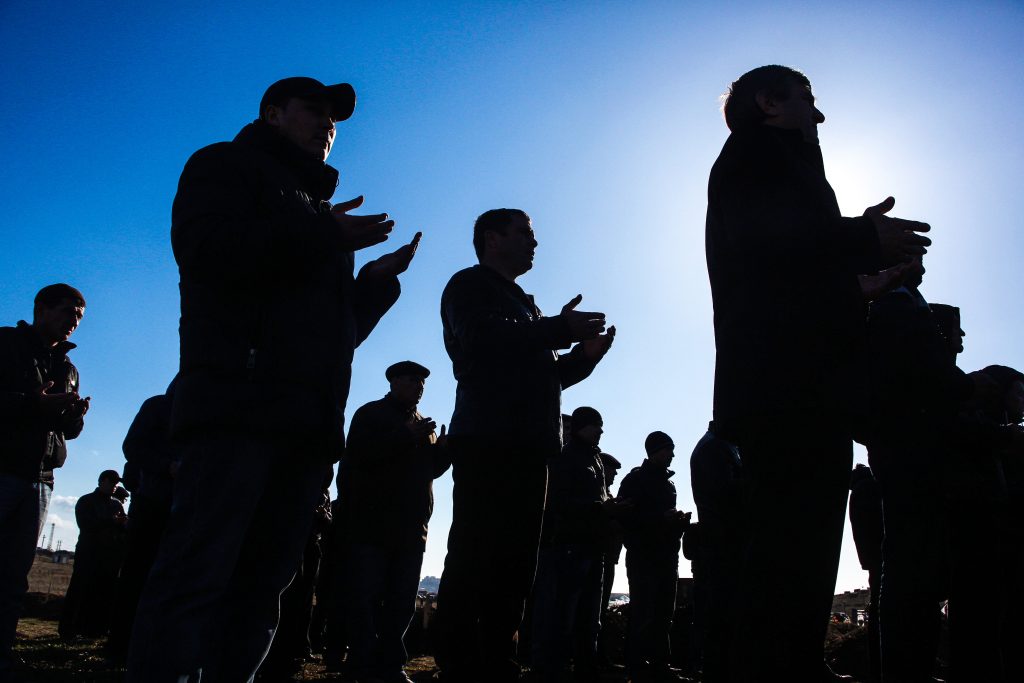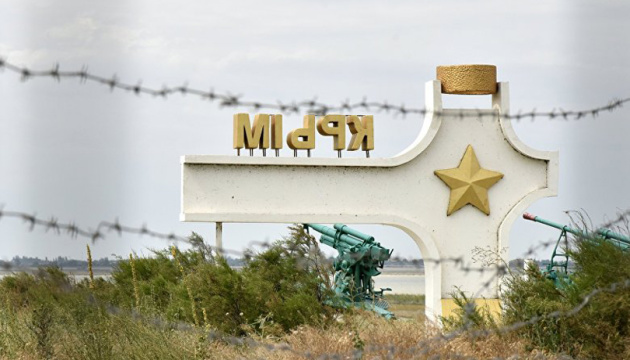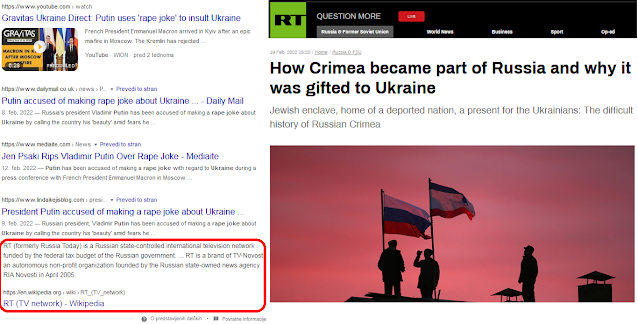Russia is forcing Ukrainians from occupied Crimea and Donbas to fight in its invasion of Ukraine

Ukrainian soldier outside a Zhytomyr school destroyed by Russian enemy shelling (one of the crimes that Russia is forcibly mobilizing Ukrainians from occupied territory to commit). Photo Viacheslav Ratynsky, Reuters.
Russia is illegally mobilizing Ukrainian men from occupied Crimea and Donbas to take part in its invasion of Ukraine and kill fellow Ukrainians. Human rights groups and the President’s Representative Office on Crimea are circulating in Ukrainian; Russian and Crimean Tatar a clear guide explaining to young Ukrainian citizens how to try to avoid being forcibly mobilized and what to do if this proves impossible.
Ukraine began sounding the alarm over forced conscription in occupied Crimea soon after Russia’s invasion and annexation, and there has been international condemnation of Russia’s open violation of international law. Article 51 of the Fourth Geneva Convention states unambiguously that “the Occupying Power may not compel protected persons to serve in its armed or auxiliary forces. No pressure or propaganda which aims at securing voluntary enlistment is permitted”.
Russia has been conscripting Crimean lads for almost eight years, and a considerable number have faced illegal criminal prosecution for refusing to do military service. It has also waged active propaganda of its armed forces on occupied territory, with systematic militarization of childhood from preschool years.
Now the absolute worst has happened, with Russia, as invader, forcing young men on territory already occupied, to join its forces trying to seize more Ukrainian land. From a preliminary list of prisoners of war captured by Ukraine while fighting in Russia’s army of war, the Crimean Human Rights Group reported on 5 March that it had identified ten young Crimean conscripts and one Crimean contract soldier.
The number of Crimeans is likely to be much higher, and we know that, since 18 February, the Russian proxy ‘Donetsk and Luhansk people’s republics’ have been seizing and forcibly ‘mobilizing’ men between 18 and 55. Of a supposed ‘Russian’ unit who surrendered to the Ukrainian Army, most had been forcibly seized from schools and technical colleges where they were working. Several were addressed, and answered in Ukrainian.
The advice page to young men at risk of conscription points out that all residents of occupied Crimea and Donbas are Ukrainian citizens. This is regardless of whether they have been forced into receiving Russian citizenship.
“If you are forcibly mobilized into the Russian Federation armed forces or illegal armed bodies, linked with them, you will be viewed by Ukraine as a victim of Russia’s war crime.” Readers are assured that those responsible for such crimes will face liability according to Ukrainian legislation and / or at the International Criminal Court.
So what should those facing mobilization do?
The first advice is to sabotage such ‘service’ in the armed forces of the aggressor state. Avoid personally receiving the call-up notice or phone calls from the occupation military recruitment offices (including by changing phone number, address, etc.)
If this does not work, and you are forcibly mobilized, “As soon as you get onto territory under Ukrainian control or at your first meeting with Ukraine’s Armed Forces, surrender and inform them that you are a Ukrainian citizen from occupied Crimea, Donetsk or Luhansk oblasts (even if you don’t have documents confirming this, we will establish this). Then you will remain only a victim of a war crime in Ukraine, and you will, with time, be able to safely return home alive.”
Do not obey illegal orders that could lead to civilian casualties or destruction of civilian infrastructure If you do so, your actions will be classified as crimes that have no time bar and you will eventually be held accountable, according to Ukrainian and international law. The advice ends with an unequivocal warning that those voluntarily enlisting in Russia’s armed forces and taking part in the aggressor’s war against Ukraine will face up to 15 years’ imprisonment in accordance with Ukrainian legislation. If a person held a commanding post, they could be tried by the International Criminal Court.
Russia is certainly using occupied Crimea as a military platform for its war against Ukraine, with military formations brought by railway via Russia’s illegal Crimea bridge from Russia. The President’s Representative Office reports that witnesses have seen such formations, made up of 23 carriages with servicemen for three days running. It reports also that at the very beginning of its war, Russia installed launch pads on the roofs of private homes in northern Crimea.
According to the Representative Office’s information, the hospitals in norther Crimea (Armyansk; Krasnonerekopsk and Dzhankoy) hospitals are full of wounded Russian (or forcibly mobilized Ukrainian) soldiers, with each having around 1,000 to 1,500 men
From https://www.aa.com.tr/en/turkey/-deportation-of-crimean-tatars-in-1944-was-genocide-/1865274
‘Deportation of Crimean Tatars in 1944 was genocide’
 Crimean Tatars were kept in extremely harsh conditions, and half of them were killed, says foreign policy expert
Crimean Tatars were kept in extremely harsh conditions, and half of them were killed, says foreign policy expert
Gozde Bayar |04.06.2020
The
Soviet Union’s brutal 1944 deportation of Crimean Tatars bears all the
hallmarks of genocide, according to a foreign policy expert.
Hakan
Kirimli, a political scientist at Bilkent University in Turkey's
capital Ankara, told Anadolu Agency that on May 18, 1944, the Soviet
Union exiled all the Tatars from Crimea, leaving not a single one.
“They were kept in extremely harsh conditions where they were sent, and half of them were killed,” Kirimli added.
Describing
the deportation as a “genocide,” Kirimli said: “They wanted the Crimean
Tatars to completely disappear from history, and they even removed the
phrase 'Crimean Tatar' from the records, saying that there would be no
such people again.”
On Tuesday, the Ukrainian Parliament passed a bill calling on the UN and international organizations to recognize the deportation of the Crimean Tatars as genocide.
Genocide was first recognized as a crime under international law in 1946 by the UN General Assembly, saying it involves “killing members of the group, causing serious bodily or mental harm to members of the group, deliberately inflicting on the group conditions of life calculated to bring about its physical destruction in whole or in part.”
Kirimli,
who is of Crimean Tatar descent, said that during the deportation,
groups of about 300 Crimean Tatars were put in a covered wagon “like a
sack of potatoes” with no room to move.
“Imagine that your child,
brother, or grandfather is dying in front of your eyes. His dead body
continues standing with you because there’s no room on the floor,”
Kirimli said, adding that these deportation journeys took nearly 20-25
days.
The aim was to completely destroy these people and turn Crimea into purely Russian territory, he stressed.
Underscoring
that the Crimean Tatars struggled democratically and non-violently
against the Soviet Union for 30-40 years, he said they returned to their
homeland in harsh conditions, especially after the dissolution of the
USSR.
Russian annexation of Crimea
Kirimli went on to say
that commemorating the 1944 events without condemning the recent Russian
occupation of Crimea shows “great insincerity.”
 Denouncing
the Russian annexation of Crimea in 2014, he said the “inhuman and
illegal” occupation has continued in Crimean territory for six years
now.
Denouncing
the Russian annexation of Crimea in 2014, he said the “inhuman and
illegal” occupation has continued in Crimean territory for six years
now.
“Nearly 50,000 Crimean Tatars used to gather in
Simferopol, the capital of Crimea, to commemorate the deportation. Now,
not even three people could come together to commemorate it,” he added.
He said Crimean Tatars are not allowed to commemorate or talk about the exile on pain of 15-20 years in prison as penalty.
“Almost
all schools and media outlets of the Crimean Tatars were closed,” he
said, underlining that opinion leaders were either deported from Crimea,
detained, or jailed.
The annexation was a crime against humanity
and violation of international law, he said calling on the
international community to toughen sanctions against Russia.
“If
there were no real sanctions and Russia were not punished by the
international public, these people [native Crimeans] would disappear and
international law would be trampled on,” he added.
Six years
have passed since Russia illegally annexed from Ukraine the Crimean
Peninsula on the northern end of the Black Sea, largely populated by
Crimean Tatars.
Russian forces entered the peninsula in February
2014, with Russian President Vladimir Putin formally dividing the region
into two separate federal subjects of the Russian Federation the
following month.
Since then, Crimean Tatars have continued their struggle for Ukraine's territorial integrity against Russian occupation.
Crimea's ethnic Tatars have faced persecution since Russia’s 2014 takeover of the peninsula, a situation Turkey has decried.
Turkey and the U.S., as well as the UN General Assembly, view the annexation as illegal.
May 17, 2020
From Stalin to Putin: The Crimean Tatars face a new era of Kremlin persecution
By Polina Sadovskaya and Veronika Pfeilschifter

This week marks 76 years since Stalin deported nearly 200,000 Crimean Tatars from their homeland, but there will be no major commemorative events in their native Crimea. Ever since Russia’s illegal annexation in 2014, the peninsula’s indigenous people, the Crimean Tatars, have been denied the right to publicly remember their mass deportation. This ban on remembrance is just one particularly visible aspect of a far broader persecution campaign by the Russian occupation authorities that offers distressing echoes of Soviet crimes against humanity.
When the shock of Vladimir Putin’s Crimean crime was still fresh, the plight of the peninsula’s Crimean Tatar population generated considerable international attention. However, as the Russian occupation enters its seventh year with no end in sight, the fate of Crimea’s indigenous people is now in danger of fading from view. Despite grand promises made at last year’s deportation anniversary events, there has been little or no progress over the past twelve months towards addressing the ongoing attacks on the Crimean Tatars’ fundamental freedoms and the smothering of their collective memory, culture, and heritage.

Today’s low levels of international awareness reflect Crimea’s general disappearance from the geopolitical radar. Indeed, merely getting reliable information about the current situation on the peninsula is immensely challenging. Journalists, writers, and other truth-tellers have been silenced over the last six years. Ukrainian human rights NGOs have documented 369 cases of violations of free expression; the number of independent media outlets has decreased by around 90 percent; Ukrainian TV channels and radio stations have been denied the right to broadcast; and dozens of Ukrainian news websites have been blocked. Meanwhile, the international media is denied access altogether or closely chaperoned and prevented from challenging official Kremlin narratives.
Nevertheless, the fragmented and partial picture that does emerge is enough to set alarm bells ringing. The Russian occupation authorities in Crimea have detained and physically abused Crimean Tatars, raided their homes, and created an atmosphere of fear, trauma, and intimidation. Human rights organizations have officially documented at least 1500 violent incidents. Alongside a campaign of political persecution targeting today’s Crimean Tatar community, the Russian authorities have also sought to wipe out Crimean Tatar culture, heritage, identity, and memory.
Why is Russia persecuting the Crimean Tatars?
Ever since the Russian operation to seize control of Crimea began in February 2014, the Crimean Tatar community has consistently opposed the Kremlin takeover. Most Crimean Tatars boycotted the fig leaf “referendum” staged by Russia in March 2014 to legitimize the military seizure of the Ukrainian peninsula. Alim Aliev, director at Crimean House, an institution dedicated to preserving and promoting Crimean Tatar culture, explained this opposition by commenting, “Accepting the occupation of Crimea for us is like cutting off our right hand and saying that it is not needed.”
The Russian government, in need of pseudo-legal cover for its attacks on Crimean Tatars, has tarred them as terrorists and extremists. Many Crimean Tatars identify as Muslim. In 2016, Russia declared the Crimean Tatars’ historic self-governing body, the Mejlis, an extremist organization and abolished it. Dozens of Crimean Tatars have faced what Human Rights Watch calls “trumped up terrorism charges.” Authorities claim some Crimean Tatars are members of Hizb ut-Tahrir, an Islamic organization banned in Russia but not in Ukraine.
Despite claiming to be confronting militant Islam and other forms of extremism, Russia has launched attacks on a wide variety of Crimean Tatars who have spoken out against the occupation including journalists, photographers, and activists. These groups have formed the most visible and direct opposition to Russia’s occupation. Many have self-organized in the Crimean Solidarity movement. According to Freedom House, there are currently ten civic journalists imprisoned under spurious charges.
How has the Ukrainian government reacted to this ongoing repression of its citizens? With so many Crimean Tatar political prisoners behind bars, families were disappointed when the last prisoner swap between Ukraine and Russia in April this year did not include a single Crimean Tatar. In response, some members of the community initiated an online flashmob asking Ukrainian President Volodymyr Zelenskyy to finally “talk to them.”
Despite Russian attempts to paint Crimean Tatars as terrorists, the parents, wives, and relatives of those imprisoned have chosen non-violent ways to resist. They have organized robust support campaigns and rallies for their loved ones. Several prominent women activists have played key roles in these efforts. Lutfiye Zudiyeva is a children’s rights activist who has advocated on behalf of children whose fathers have been illegally imprisoned. Zudiyeva has been vocal about the need to reestablish investigative and professional journalism in Crimea, and has endured harassment and detention after participating in international advocacy campaigns.
Mumine Saliyeva, the coordinator of the Crimean Childhood NGO and wife of political prisoner Seiran Saliyev, was charged in 2019 alongside Zudiyeva for spreading “propaganda using extremist symbols” after organizing solidarity events. For years, these women have continued their advocacy around the world, fighting both for the return of their loved ones and the preservation of their traditions and culture.
Crimean Tatars now desperately need allies in Ukraine, in the rest of Europe, and around the globe. The US and European governments must acknowledge that Russia, as part of its annexation strategy, is ruthlessly repressing the rights of Crimean Tatars and attempting to quash their identity. And people all over the world need to speak out in defense of the many Crimean Tatars who are currently being held as political prisoners by Russia.
As the Crimean Tatar community marks the seventy-sixth anniversary of their Soviet deportation this week, an entire generation faces the prospect of another year living in terror at home or forced into exile. Much as the community had feared in 2014, history is indeed repeating itself. It is now up to the outside world to hold Putin accountable and prevent a sequel to one of twentieth century totalitarianism’s darkest chapters.

Population of Crimea increased by one million due to migration from Russia during occupation – expert
"Instead of the pre-war permanent population of the Crimean peninsula of 2,350,504 people, we are currently dealing with a de facto population of at least 3,100,000 people. During the years of occupation of the Autonomous Republic of Crimea and the city of Sevastopol, the existing population of the peninsula has grown by at least 1 million people due to migration from the Russian Federation," Andrii Klymenko, head of the Monitoring Group of the Institute for Black Sea Strategic Studies, posted on Facebook, Ukrinform reports.
According to him, already more than 1 million "colonizers" account for 2 million "pre-war" Crimeans, remaining out of almost 2.4 million people.
According to the expert, the "colonizers" will make up the vast majority of the population in the occupied Crimea in a few years.
"This is the policy of the Russian Federation. "Migration weapons" and socio-cultural alteration of the population in the process of colonization of new territories by the Russian Empire and the Soviet Union have a long history. Modern Russia uses these patterns from historical experience," Klymenko explained.
In accordance with the Rome Statute of the International Criminal Court, the transfer by the Occupying Power of parts of its own civilian population into the territory it occupies is a war crime.












No comments:
Post a Comment